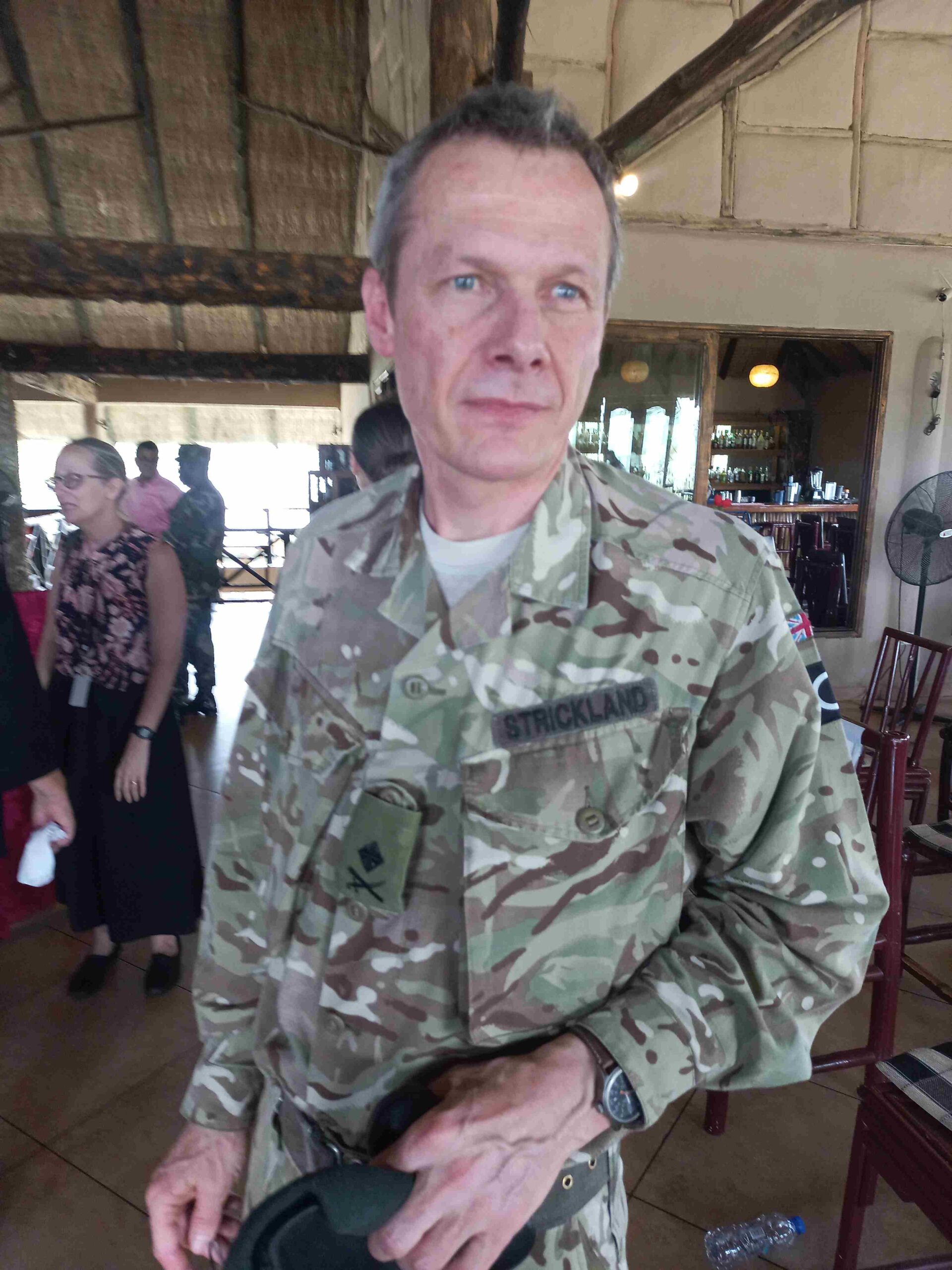PEACE JOURNAL publishes an interview its Editor – Kofi Ampeah-Woode had with Major General (Maj Gen) Gerald Strickland – General Officer Commanding (GOC), 6th (United Kingdom) Division of the British Army – on the fringes of the Distinguished Visitors’ (DV) Day of Exercise FLINTLOCK ’23, at the Sogakope Beach Resort.

PJ: What is the British Army doing here at FLINTLOCK 23?
MGGS: I have a number of troops under my command who are supporting this Exercise Flintlock 23 as we have done in previous FLINTLOCKs, we do every year. What we do is we build on the partnerships we have routinely, and then we bring that into the exercise. We work with Ghanaian forces, Ghanaian Special Operations Brigade and we train with them throughout the year, and then we also come to this exercise with them and maintain that relationship and partnership.
PJ: You have troops in this exercise? How many are they?
MGGS: We have troops, from the UK, in total of about 30, not all special operations but a mixture of different participants, and the main thing that we are focusing on is different levels of training, that are going on in this exercise, some up in the North in Tamale and Daboya, and also at the Headquarters in Accra, where we have been working with our Ghanaian counterparts on developing systems for exercising command and control of these kind of operations.

PJ: At the end of this exercise, what are the takeaways we should be seeing?
MGGS: It is the same as any exercise; we have to do more. Interoperability is important. We have to develop our systems, command and control is everything. You have to work at how you bring in intelligence, work at how you make decisions and how you give direction for activities to take place. And then the troops need to practice those activities. That is what they have been doing in this exercise. No one is ever perfect; everyone needs to improve always and we are on that journey together. It is difficult. We live in a technological age; you have to incorporate lots of different types of technology to make things more effective.
PJ: Last year you did Cambrian Patrols, was that not enough, did you have to come into this particular one also?
MGGS: Cambrian Patrol is an excellent patrol exercise we run in the United Kingdom, in Wales, every year and teams from all over the world come and take part. It is one training event for teams. Ghana sent two teams which was excellent to see. Teams learn skills and they develop and maybe when they come back to their countries, they implement those things they have learned, sometimes it is just about building their own teams and making them more effective, because they got the training opportunity.

PJ: How about giving some of your sophisticated weapons and weaponry to the African partners. I realized from this exercise that you are only imparting knowledge and skills?
MGGS: We are always trying to improve weapons but more importantly, we try to improve the whole system – how do you get information, how do you use that information to make decisions, then how do you use technology to help you be more precise, whether by the use of your weapons or to have more stand-offs so you can operate from further away. These are the sort of things that technology gives you the opportunities to do.
PJ: Recently we heard of a collaboration between the Chinese and Russian Navies to have some manoeuvres with South Africa in their waters. How comfortable or agitated are the Western militaries with that?
MGGS: Well, I do not know about what anyone is doing on any of the African countries. What is important to us is the relationship that we have with the countries that we have trust with, and the nations that are exercising here on Ex FLINTLOCK. All these nations we value their relationships, it is important to us, because it is global security issues that we are all facing together – Violent Extremism (VE), terrorism, they affect all of us and we have to work together to fix these problems.
PJ: Are Africans not being boxed into a corner, such that if a country looks to the West, then she is concerned about displeasing the East, vice versa, why not concert all the efforts, wherever they are coming from?
MGGS: Everything has to be done in partnership. Truly, some relationships are more difficult than others. You have to look at global events. There are some activities ongoing, like Ukraine, which is of great concern to us in the United Kingdom, and that makes it difficult for us to work with some nations, for obvious reasons, because it is a distraction from the real security issues that we are facing.

PJ: Looking forward with your Army’s relationship with the Ghana Army, what should we see?
MGGS: I think we will just continue to work together. We are all trying to develop at a fast pace; we are trying to adapt all of our military structures because of the new threats, new equipment, new systems and technologies, we are on this journey together, and I think that we will continue to send people here. We will welcome Ghanaian Armed Forces to the UK to train, and share experiences with each other on the development journey that we are on.
